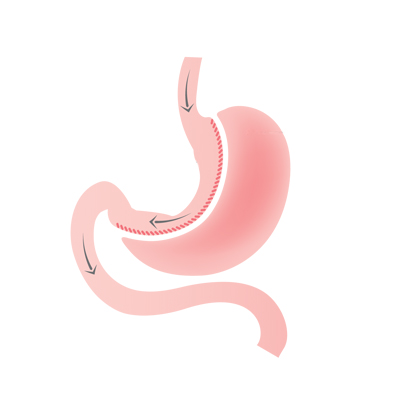At St. Louis Bariatrics, we understand that achieving sustainable weight loss is a challenging journey, and sometimes, diet and exercise alone may not be enough. Led by bariatric surgeon Dr. Jay Michael Snow, our experienced team provides compassionate and effective weight loss solutions for patients in St. Louis, MO. Gastric sleeve surgery is one of the proven treatment options we offer to help individuals take control of their health and achieve their weight loss goals. With our personalized approach and dedicated support, many of our patients have transformed their lives, gaining the opportunity to lead healthier, more active, and fulfilling lives.
- What is Gastric Sleeve Surgery?
- Benefits of Gastric Sleeve
- Who is a Candidate for Gastric Sleeve Surgery?
- Preparing for Gastric Sleeve Surgery
- The Gastric Sleeve Procedure
- Recovery After Gastric Sleeve
- Gastric Sleeve Results
- Plan Your Gastric Sleeve Procedure
- How Much Does Gastric Sleeve Surgery Cost?
- FAQs About Gastric Sleeve
What is Gastric Sleeve Surgery?
Benefits of Gastric Sleeve
Patients who undergo gastric sleeve surgery at St. Louis Bariatrics can experience numerous life-changing benefits, including:
Significant Weight Loss
Gastric sleeve surgery supports rapid and substantial weight reduction, with most patients achieving and maintaining a healthier weight over the long term.
Reduced Appetite and Cravings
By decreasing ghrelin levels, the hormone responsible for hunger, gastric sleeve surgery helps patients feel less hungry and more satisfied with smaller portions.2
Quicker Recovery
Performed using a laparoscopic approach, the procedure allows for faster recovery times, shorter hospital stays, and minimal scarring.3
Improvement or Remission of Type 2 Diabetes
Up to 70% of gastric sleeve patients experience significant improvement or even complete remission of type 2 diabetes.4
Relief from Sleep Apnea
Many patients with sleep apnea find they no longer need CPAP machines following their weight loss after surgery.5
Resolution of High Blood Pressure
The procedure has been shown to reduce high blood pressure, with over 70% of patients achieving full remission post-surgery.6
Who is a Candidate for Gastric Sleeve Surgery?
At St. Louis Bariatrics, every patient undergoes a comprehensive evaluation to determine if gastric sleeve surgery is the best option for their weight loss journey. Generally, candidates for gastric sleeve surgery:
- Have a BMI (body mass index) of 35 or higher
- Have a BMI between 30 and 35 with obesity-related health conditions, such as type 2 diabetes, high blood pressure, or sleep apnea
- Have made previous attempts to lose weight through diet, exercise, or other weight loss methods without success
Some individuals with a lower BMI may still qualify for gastric sleeve surgery based on specific health criteria, though they may not meet insurance requirements for coverage. In these cases, patients have the option to self-pay for their procedure.
Check your BMI and learn more about who is a candidate for bariatric surgery on our Am I a Candidate page.
Preparing for Gastric Sleeve Surgery
Preparation for gastric sleeve surgery at St. Louis Bariatrics begins with a thorough consultation with bariatric surgeon Dr. Snow. During this appointment, we will review your medical history, discuss your weight loss goals, and determine if gastric sleeve surgery is the best option for you. If it is, our team will create a customized pre-surgical plan tailored to your needs. This plan typically includes meeting with our dietitian to establish a pre-surgical diet and develop healthy eating habits that will support your journey. We will also guide you through any necessary pre-surgical tests and insurance requirements, ensuring you feel fully prepared and supported every step of the way.
The Gastric Sleeve Procedure
At St. Louis Bariatrics, Dr. Snow performs gastric sleeve surgery as a minimally invasive, laparoscopic procedure. The surgery is conducted under general anesthesia and typically takes about 60 minutes. Dr. Snow begins by making a series of small incisions on the abdominal wall, through which he inserts a laparoscope (a small camera) and specialized surgical instruments. Approximately 75-80% of the stomach is then removed, creating a narrow, sleeve-shaped stomach that limits food intake.
Because the intestines are left untouched, gastric sleeve surgery focuses solely on reducing stomach capacity, resulting in effective weight loss and beneficial hormonal changes. The incisions are closed with absorbable sutures and surgical glue, promoting a faster recovery with minimal scarring.
Recovery After Gastric Sleeve
Recovery after gastric sleeve surgery at St. Louis Bariatrics typically allows patients to resume light activities within a few days. Most patients take about one week off work, though strenuous activities should be avoided for several weeks to ensure proper healing.
Post-surgery, you’ll follow a structured diet plan that begins with clear liquids and gradually progresses to pureed and soft foods as your body adapts. Follow-up appointments with Dr. Snow and our team will help monitor your recovery and provide support. We are committed to guiding you through each phase, offering resources and dietary advice to help you maintain your weight loss success and achieve your health goals.
Gastric Sleeve Results
After gastric sleeve surgery at St. Louis Bariatrics, patients typically lose an average of 66% of their excess weight.7 Along with substantial weight loss, many individuals experience improvements or complete remission of obesity-related conditions, such as type 2 diabetes, sleep apnea, and high blood pressure.
Achieving and maintaining optimal results depends on a commitment to a healthy lifestyle. Our team will provide you with the tools and support necessary to stay on track, including guidance on proper nutrition and maintaining an active routine, helping you sustain your weight loss success long-term.
Plan Your Gastric Sleeve Procedure
- Covered by Insurance: Yes
- Financing Available: Yes
- Average Self-Pay Cost*: $11,111
- Minimally Invasive: Yes
- Non-Surgical: No
- Average Procedure Time: 1 hour
- Typical Hospital Stay: 1 night
- Typical Recovery Time: 5 to 7 days
*Prices are subject to change.
How Much Does Gastric Sleeve Surgery Cost?
$11,111 Special Self-Pay Pricing
At St. Louis Bariatrics, we believe that it’s important to offer our patients competitive pricing and to be transparent about the cost of gastric sleeve surgery
The most valuable gift you can give to yourself and your loved ones is good health, and we are committed to helping people reach their weight loss goals in order to live longer, happier lives. St. Louis Bariatrics has special self-pay pricing for Gastric Sleeve Procedures that is available for patients who don’t have insurance coverage for weight loss surgery, as well as patients who would prefer to self-pay to avoid the obstacles and waiting periods frequently associated with insurance.
Our special self-pay price of $11,111 for sleeve gastrectomy includes*:
- Facility Center Fee
- Surgeon Fee
- Surgical Assistant Fee
- Anesthesiologist Fee
- Postoperative Follow Up Appointments with Dr. Snow
- Post-operative Follow Up with Licensed Dietitian
- FMLA Paperwork Completion
In addition to the many health benefits of weight loss, patients who undergo weight loss surgery are often able to reduce their lifelong medical and healthcare costs. Visit our payment options page to learn about financing options and potential tax incentives for weight loss procedures. Contact us today for more information or to schedule a consultation.
*Additional minor fees may apply depending upon medical history and needs.
Patient Results

Patient Name: Michael
Procedure:
Gastric Sleeve
Total Weight Loss:
201 lbs
"My future goals are to continue to remain healthy and help educate others about how not to make the mistakes that I made that nearly cost me my life. I am healthy and fit again."
View MoreFAQs About Gastric Sleeve
What’s the difference between gastric sleeve and other bariatric procedures like gastric banding?
Gastric sleeve surgery involves permanently removing a large portion of the stomach, which not only reduces food intake but also alters hormone levels that influence hunger and metabolism. In contrast, gastric banding uses an adjustable band to create a smaller stomach pouch temporarily, without affecting hormone levels. Many patients find that gastric sleeve surgery offers more sustainable and satisfactory weight loss outcomes.
How do I know which bariatric surgery is right for me?
At St. Louis Bariatrics, we take the time to evaluate each patient, including their health, medical history, and their goals. Dr. Snow is highly experienced in a full range of bariatric surgery procedures, including gastric bypass and gastric banding (Lap-Band®), as well as non-surgical options, so you can rest assured he will recommend the procedure that is best for you.
What are the risks of gastric sleeve surgery?
Gastric sleeve surgery is generally safe, but like any surgical procedure, it carries potential risks and complications. These may include bleeding, infection, blood clots, staple line leakage, and heartburn or acid reflux.8 Dr. Snow and the team at St. Louis Bariatrics will thoroughly review all risks and take every precaution to ensure patient safety.
How much weight can I expect to lose after gastric sleeve surgery?
Weight loss results vary for each patient, but on average, most patients lose around 60-70% of their excess weight within the first year. Long-term success depends on adherence to dietary guidelines and an active lifestyle.
Is gastric sleeve surgery covered by insurance?
Many insurance companies provide coverage for gastric sleeve surgery when it is deemed medically necessary. At St. Louis Bariatrics, we offer a complimentary insurance verification service to help you determine your eligibility and understand your benefits.
How long is the recovery period after gastric sleeve surgery?
Most patients can resume light activities within a few days after surgery and return to work within one week. However, you will need to avoid strenuous activities for several weeks to promote proper healing.
Will I need to follow a special diet after surgery?
Yes, a structured post-surgical diet is essential. Initially, patients start with a clear liquid diet, gradually moving to pureed foods, and then soft foods over the following weeks. Our dietitian will provide a comprehensive plan and guidance to support your recovery and long-term success.
Is the weight loss permanent after gastric sleeve surgery?
Gastric sleeve surgery offers long-lasting weight loss results, especially when patients commit to maintaining lifestyle changes including healthy dietary habits and regular exercise. Most patients sustain their weight loss for years following the procedure.
Can I become pregnant after gastric sleeve surgery?
Yes, pregnancy is possible after gastric sleeve surgery. However, it is advised to wait at least 12-18 months post-surgery to allow for sufficient weight loss and nutritional stabilization. It is important to discuss your plans with Dr. Snow to ensure a safe and healthy pregnancy.
Where Do I Go From Here?
Dr. Jay Snow takes pride in helping patients get a second chance at health and happiness. In an initial consultation, he will review your medical history, listen to your concerns, explain your options and help you take the next steps to a healthier you. Join Us for a FREE Seminar or contact us to schedule your consultation with Dr. Snow today.
Sources
1 Pradhan G, Samson SL, Sun Y. Ghrelin: much more than a hunger hormone. Curr Opin Clin Nutr Metab Care. 2013;16(6):619-624. doi:10.1097/MCO.0b013e328365b9be. Available: https://www.ncbi.nlm.nih.gov/pmc/articles/PMC4049314/. Accessed October 24, 2024.
2 Benaiges D, Más-Lorenzo A, Goday A, Ramon JM, Chillarón JJ, Pedro-Botet J, Flores-Le Roux JA. Laparoscopic sleeve gastrectomy: More than a restrictive bariatric surgery procedure? World J Gastroenterol. 2015 Nov 7;21(41):11804-14. doi: 10.3748/wjg.v21.i41.11804. PMID: 26557004; PMCID: PMC4631978. Available: https://pubmed.ncbi.nlm.nih.gov/26557004/. Accessed October 24, 2024.
3 Nguyen NT, Goldman C, Rosenquist CJ, et al. Laparoscopic versus open gastric bypass: a randomized study of outcomes, quality of life, and costs. Ann Surg. 2001;234(3):279-291. doi:10.1097/00000658-200109000-00002. Available: https://www.ncbi.nlm.nih.gov/pmc/articles/PMC1422019/. Accessed October 24, 2024.
4 Capoccia, F. Coccia, A. Guida, M. Rizzello, F. De Angelis, G. Silecchia, F. Leonetti, “Is Type 2 Diabetes Really Resolved after Laparoscopic Sleeve Gastrectomy? Glucose Variability Studied by Continuous Glucose Monitoring”, Journal of Diabetes Research, vol. 2015, Article ID 674268, 8 pages, 2015. https://doi.org/10.1155/2015/674268. Available: https://www.hindawi.com/journals/jdr/2015/674268/. Accessed October 24, 2024.
5 Hoyuela C. Five-year outcomes of laparoscopic sleeve gastrectomy as a primary procedure for morbid obesity: A prospective study. World J Gastrointest Surg. 2017;9(4):109-117. doi:10.4240/wjgs.v9.i4.109. Available: https://www.ncbi.nlm.nih.gov/pmc/articles/PMC5406732/. Accessed October 24, 2024.
6 Hoyuela C. Five-year outcomes of laparoscopic sleeve gastrectomy as a primary procedure for morbid obesity: A prospective study. World J Gastrointest Surg. 2017;9(4):109-117. doi:10.4240/wjgs.v9.i4.109. Available: https://www.ncbi.nlm.nih.gov/pmc/articles/PMC5406732/. Accessed October 24, 2024.
7 Praveenraj P, Gomes RM, Kumar S, et al. Comparison of weight loss outcomes 1 year after sleeve gastrectomy and Roux-en-Y gastric bypass in patients aged above 50 years. J Minim Access Surg. 2016;12(3):220-225. doi:10.4103/0972-9941.183481. Available: https://www.ncbi.nlm.nih.gov/pmc/articles/PMC4916747/. Accessed October 24, 2024.
8 Mayo Clinic. Sleeve Gastrectomy. Available: https://www.mayoclinic.org/tests-procedures/sleeve-gastrectomy/about/pac-20385183. Accessed October 24, 2024.
Dr. Jay Snow has either authored or reviewed and approved this content.






